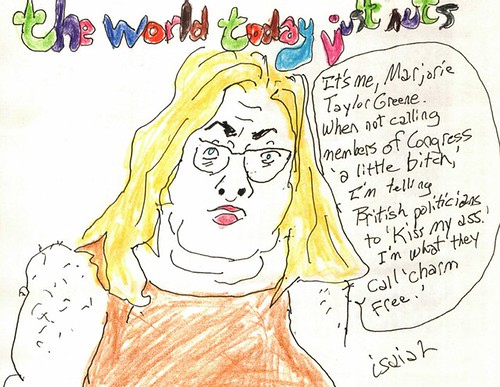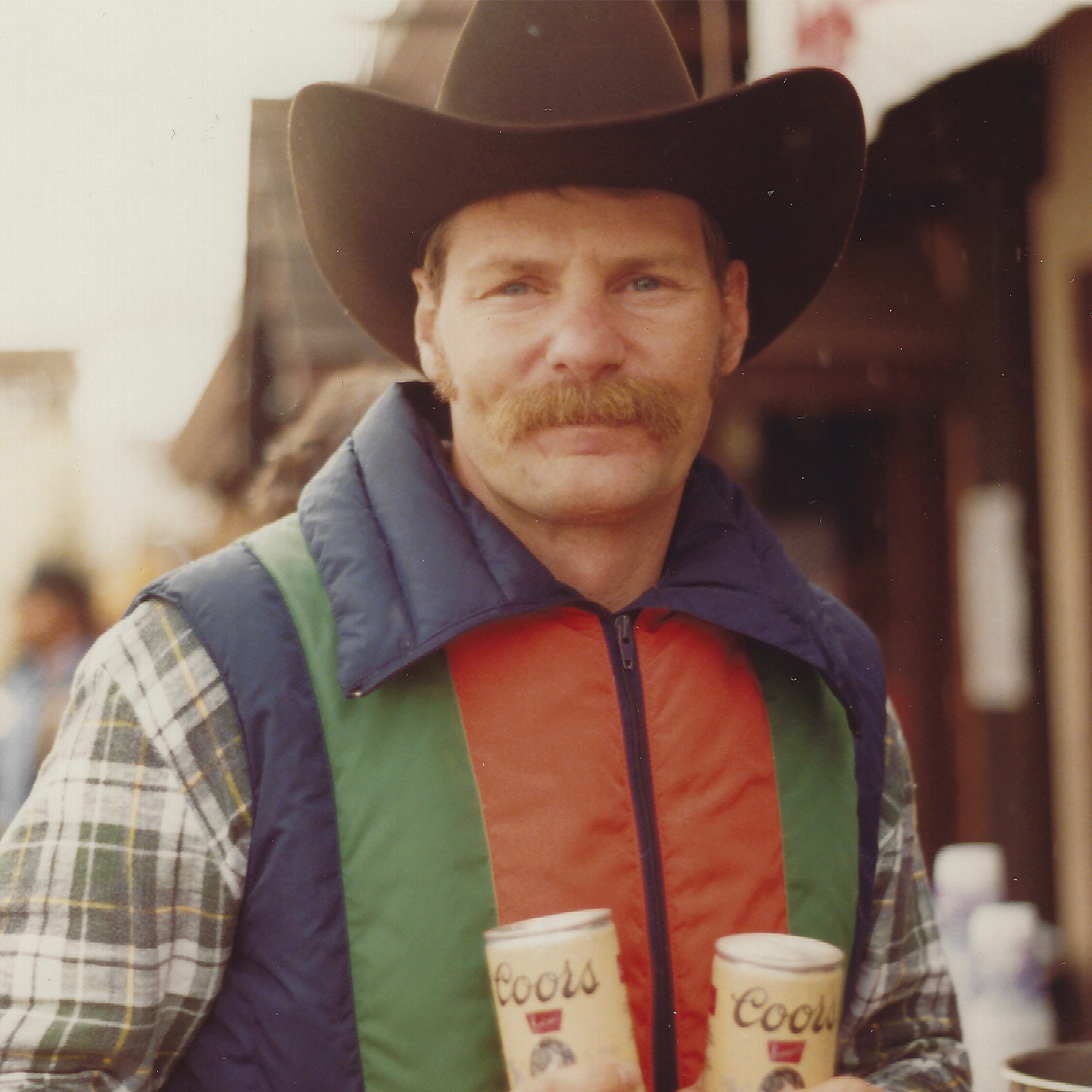Isaiah's THE WORLD TODAY JUST NUTS "Charm Free Marjorie" went up tonight.
Social media erupted with criticism of Greene's comments, with users denouncing her behavior as "trashy and gross" and questioning her purported "PhD in recognizing ."
"She is so trashy and gross," one posted on X.
"She does not, in fact, have a PhD in anything," another wrote.
"Should have stopped at, 'I'm not a doctor,'" someone else joked.
"I feel better knowing she is there to guide us, Said no one ever," another quipped.
| ||||||||||||||||||||||||||||||||||||||||||||||||||
| ||||||||||||||||||||||||||||||||||||||||||||||||||
"Iraq snapshot" (THE COMMON ILLS):
Investigating the circumstances of these war-related deaths – which also included three Lebanese and two Israeli journalists – was particularly challenging, not only because of the large number of deaths in a short time, but also because of the loss of those who could have provided more information. Many journalist victims’ families were killed along with them in Gaza, their colleagues died or fled, and Israeli military authorities adamantly deny targeting journalists or provide only scant information when they acknowledge press killings. Critical information about their lives and work may have been lost forever. (See more about our methodology for documenting journalist deaths here and here.)
The 2023 global total – the highest since 2015 and an almost 44% increase on 2022’s figures – includes a record number of journalist killings – 78 – that CPJ research determined were work-related, with eight more still under investigation. Thirteen media workers also were killed last year.
[. . .]
Almost all of the journalists killed in the Israel-Gaza war were Palestinian, and CPJ has raised concerns about the deliberate targeting of members of the media by the Israeli military.
Cases include that of Issam Abdallah, a Lebanese visual journalist for Reuters. Independent investigations by international news organizations and rights groups found evidence indicating that Israeli forces targeted a group of reporters – killing Abdallah and injuring six others – in southern Lebanon on October 13. The journalists, all wearing press insignia, were covering border crossfire between the Israel Defense Forces and pro-Hamas militants from Lebanon’s Hezbollah group in the days after Israel responded to Hamas’ deadly October 7 incursion by launching devastating retaliatory strikes on Gaza. The investigations found that Abdallah’s group was reporting from a location where no fighting was taking place when they were hit by two Israeli shells.
In January 2024, journalists Hamza Al Dahdouh and Mustafa Thuraya were killed in what Israel acknowledged was a targeted attack on a car in which they were traveling. It accused Al Dahdouh, who worked for Al-Jazeera, and freelancer Thuraya of being members of terrorist groups – a charge strongly denied by Al-Jazeera and the men’s family and colleagues. In CPJ’s May 2023 report “Deadly Pattern,” CPJ noted several cases in which journalists killed by Israeli forces were accused of being terrorists and in which no credible evidence was ever produced.
CPJ, along with other organizations, is now investigating whether a dozen other journalists – and, in some cases, members of their families – killed in the Israel-Gaza war also were targeted by the Israeli military. These cases include Al-Jazeera cameraperson Samer Abu Daqqa, who bled to death after Israeli authorities blocked efforts to evacuate him. The probes into these killings are taking place against the backdrop of the “Deadly Pattern” report, which found that members of the Israel Defense Forces had killed at least 20 journalists over the past 22 years and that no one had ever been charged or held accountable for their deaths.
With that in mind, from yesterday's DEMOCRACY NOW!
NERMEEN SHAIKH: The raid on Nasser Hospital in Khan Younis comes as fears are mounting that Israel will act on its plans to launch a ground invasion into Rafah, the southernmost part of Gaza that Israel had previously declared a safe zone.
Over half of Gaza’s population, some 1.4 million people, including over 600,00 children, are crammed into Rafah after being displaced from their homes and driven south during Israel’s brutal assault. There are now massive tent encampments pushing up to the Egyptian border.
International pressure is mounting for Israel to call off its ground invasion. The U.N.’s top humanitarian official, Martin Griffiths, said that an assault on Rafah, quote, “could lead to a slaughter.”
AMY GOODMAN: We go now to Rafah, where we’re joined by journalist Akram al-Satari.
Akram, welcome back to Democracy Now! We have just heard these chilling reports from inside Nasser Hospital right before Israel occupied it and the bombing of it. You’ve sent out a picture of some of the ammunition used by the Israeli military. Explain what happened inside and also what’s happening around you in Rafah.
AKRAM AL-SATARRI: Well, the situation continues to be extremely dire in the vicinity and inside Nasser medical complex. The Israeli occupation forces have been targeting the vicinity of the area, including some of the UNRWA shelters not far away from the hospital. They are destroying and they were destroying the walls of the hospital, the exterior wall of the hospital. They targeted the wards of the hospital. They’re in wards of the hospital. They targeted the surgery department in the hospital and injured at least one surgeon while he was inside the surgery department.
They asked people to leave the hospital, and when they were leaving the hospital, they shot them dead. They asked one guy, whose hands were tied, and he was sent to the people inside the hospital, to the internally displaced people, asking them to leave the hospital. And then, when he ended up speaking to the people and returning to the Israelis, because he was fearful from death, he was killed, and he was left on the ground.
Around 80 bodies are laid right in front of the outer gate of the Nasser Hospital, up to some 200 meters away from the hospital. Fear, death and shock are enclaving and encircling the people in that area. The Israeli occupation forces continue their operation, continue targeting Nasser Hospital, continue to ask people to leave, and then when they are leaving, they snipe them. There are some disturbing images and footage of the people — of the bodies of the people being eaten and devoured by the dogs and by the stray cats. People who were just communicating with their relatives were describing the horrors, and they were also documenting those horrors.
Israel continues to target the hospitals. They target Nasser Hospital, and they are still targeting Al-Amal Hospital not far away from Nasser Hospital, around one, 1.5, two, 2.5 kilometers, in Al-Amal neighborhood. And they continue the very same policy, the policy of targeting the medical complexes, targeting the medical personnel, targeting the patients, targeting the escorts, and spreading the fear and destruction in that area. Some of the people who were inside Khan Younis were rushing, were pulling the beds of their dears, some of them in the orthopedic department that was targeted, some of them in the general surgery department. And they were carrying or pulling the beds for around five or six or seven kilometers to reach Rafah.
As you can see, now the Abu Yousef al-Najjar Hospital, where I am located now, has been receiving numbers of the people who were inside Nasser Hospital and Al-Amal Hospital. They received them. They are trying to expand the bed capacity of the hospital. They are trying to accommodate to the influx of people who are fleeing from Nasser Hospital, who are fleeing for their safety, who are fleeing for their life. And they end up staying in tents like those, where sanitation is at question, where the quality of the medical care provision is at question, too, where the large number of people who are already staying inside the hospital prevent them from absorbing or accommodating any other additional number of people injured. The health system at large has been struggling.
The infrastructure of the whole city of Rafah cannot absorb or accommodate the large number of Palestinians inside Rafah. Around 1.2 million Palestinians were staying in Rafah. Now tens of thousands of them are leaving Rafah and heading towards Khan Younis and towards Gaza’s central area, with doubts of the continuous and with fear of the looming ground invasion that is likely to be a replication of everything that was done in Gaza in the north and everything that was done in Khan Younis.
People were hopeful that the ICJ, International Court of Justice, would bring them justice or would at least make Israel reconsider its tactics when it comes to protected objects, human objects, and health facilities, also journalists. But it looks like Israel is continuing the very same approach. It’s continuing the very same way of targeting. We were hopeful, as journalists, that Israel wouldn’t be targeting Nasser Hospital or Al-Amal Hospital. But, unfortunately, the targeting is still continuous.
And a large number of people, tens of thousands of people, who were stuck in Khan Younis, are now being targeted, either by the artillery fire or by the quadcopters or by the F-16 or by all the other means, and they are being killed, and they are being left — even the ones who are injured are being left to die on the ground. People were describing the atrocities they have been seeing. People have been crying over their dears, who were screaming for help, but they couldn’t help them. People are now crying over their dears who are still waiting in Khan Younis and cannot be reached, cannot be rescued, cannot be saved, and they are likely to lose their life, like many others who lost their life the very same way.
As to Rafah, Rafah is the place now for around, as I said, 1.2 million Palestinians. The area is underserved, no good infrastructure, no organized camping, no organized tents, no organized service of provision. And the pressure resulting from this massive number of people is overburdening the municipalities, is overburdening the civil defense, is overburdening the Ministry of Health and is overburdening the international organizations. The concern has been voiced by the UNRWA, by the World Food Programme, by the UNICEF, by the United Nations Development Programme. And they are all warning that any ground offensive targeting Rafah is going to result in a catastrophe, a catastrophe that is bigger and much, much more bigger than the one that took place in Gaza in the north and the one that is taking place right now in Khan Younis.
People in Gaza believe that no single international power is able now to bring an end to the ongoing misery that has been caused by the ongoing occupation and the indiscriminate — this indiscriminate targeting, as described by some of the Palestinians. Some of them are already on the beds recovering. Some of them are struggling for their life. And some of them are deprived from the very basic humanitarian need to food and water. Water is missing in Gaza. Food is missing in Gaza. And people have been struggling, not for their own food need, but, rather, for their children’s food need, for the elderly people’s food need. So, the situation is dire. And it continues to aggravate into something that is extremely life-threatening, that needs an imminent — that needs an imminent intervention for the sake of stopping any atrocities that are likely to happen and stopping the atrocities that are taking place now.
And I’m quoting many of the Gazans that I spoke to, many of the ones who are worried about their dears, many of the ones who are worried also about their own safety, many of the ones who are worried about the future and what it holds for them. They think it is about time that something happens. They think they have suffered enough. They think they have died enough. They think they have been hungry enough. They think they have been thirsty enough. They think they have been homeless enough. And this is the outcry not only of the 1.2 million Gazans who are staying in Rafah, but also of [inaudible] million Gazans who are in Gaza in the north, who are in [inaudible] in Khan Younis, and who are in Rafah. People have been deprived from the access to very basic, essential food supplies and water supplies. They have been struggling. They have been facing famine. They have been seeing children who are dying from the hunger. And this is an outcry from them to the whole world that this needs to stop. And the madness that is taking place in Gaza — and I’m again quoting the people who are talking to me — the madness needs to come to an end.
As I’m talking to you, the unmanned drones are hovering all around the Gaza Strip, day and night, continuous bombardment in different parts of Rafah, in different parts of Gaza Strip at large, and they continue to take the lives and hopes of the Palestinians. Palestinians who are living in Rafah and who are living in Gaza alike have been exhausting all the negative and positive coping mechanisms. The number of people who are injured is unconceivable. The number of people killed, and the way they are being killed, is also unconceivable. And people continue to suffer. And they expect that more suffering is coming, if the international community fails once again to protect them.
NERMEEN SHAIKH: Akram al-Satarri, if you could — you, yourself, right now are standing outside a hospital. We can hear possibly a drone overhead. If you could describe the situation there? And you mentioned how people, Palestinians, there are lacking even the most basic essentials — food, water. Tell us what humanitarian aid is getting in, if any.
AKRAM AL-SATARRI: Well, I can describe the situation. I will have to describe the way I’m feeling about things and how things are unfolding. Every single time I walk one step in Gaza, I always imagine myself being blown up by an unmanned drone or by F-16 missile or by a quadcopter or by whatever weapon that is used by Israel. Every time I’m walking and every single home I pass by, I feel that this home might be targeted, and I might be ending up dying and killed under the rubble of that house, every single place I stay. I moved from my home six times. So I am homeless and displaced six times now. And I’m waiting what would happen in Rafah.
People in Rafah, as I told you, people are deprived from everything, even the very basic, essential things, the very essential things that are needed to lead a normal life or a seminormal life or a life of internally displaced people. Even the internally displaced people in Gaza are unique and different than any other internally displaced people all over the world. All over the world, people are receiving and accessing food and water supplies, according to the Sphere book. The Sphere book is a book that has been developed for the sake of just identifying the quantities that are needed and the calories that are needed for the people to stay alive at a time of famine or at a time of conflict, man-made or natural disaster. So, people are not even accessing that very limited — the threshold of food that is needed for the people in Gaza is not met, because the U.N. agencies that have been helping the Gazans are now tarnished, are now assaulted, are now attacked, and now the funding that is going to them is suspended.
So, people in Rafah and other areas have to do what they — what would they have to do to survive? Some of the people in the Gaza in the north had to do to use to food — to feed, of the animals, to ground it, the corn, to ground it, to make sure that they can bake some bread for their families. They don’t have rice. They don’t have water. They don’t have canned food. They don’t have anything.
And they have been calling for the world to stop that. And they have been even — the very emotional thing about that is that everything that is happening, including the most and profoundly shocking things, are happening live on air. People are just documenting their death. People are documenting their suffering. People are documenting their hunger. People are documenting their thirst. People are documenting their injury. People even documenting the hospitals when they are being raided and stormed in by the Israeli occupation forces. And the whole world — they have a feeling that the whole world is watching and that it’s not doing anything. And that feeling of helplessness is another way to kill the Palestinians. So, if they’re killed once, they are killed twice — once by the ongoing bombardment that has been taking place, that has been documented, and the second time by not offering the fitting homage for those people by serving justice and by stopping aggression, like was said by the many people that I talked to.
The situation is extremely dire. You will never be able to imagine the things that are happening, when you’re walking down the streets; when you see small children out crying for food; when you see lining up hundreds of people for a very limited one pot of rice or one pot of food, and they are struggling to get some of that to bring back to their families; when you see small children staying unaccompanied because they lost their whole family; when you see one man who buried his whole family and who’s walking down the street, like, losing his mind because he lost all that he dreamt would grow up with him, which is his children — he lost his wife, he lost his father, he lost his mother, he lost his house, he lost any hope in life that he can clutch to. I saw many people talking to themselves down the streets. I saw many people crying because they have no one to cry to. They have no shoulder to cry over. They have no one to look after them. They have no one to console them. They have no one even to offer them some kind word to look after them. And they are going to — and they are driven insane because of that. Situation is unconceivable. It has affected all aspects of life of Gazans. And it continues to affect them. And it has destroyed many lives, and it continues to destroy life. And it is likely to destroy any hope that Gaza would survive. And I think this is the plan, to break Gaza and to make Gaza uninhabitable and to destroy any possibility for Gazans to relive or to rebuild or to just retake their life again.
AMY GOODMAN: Gaza now has the highest percentage of people facing acute food insecurity anywhere in the world. Finally, Akram al-Satarri, as we watch you on the ground there in Rafah — and we thank you and your cameraman — we understand the very serious risks you face. I’m wondering if you question whether even to wear the vest you are wearing that says “press,” in light of the latest news just this week, bringing to possibly over 120 the number of Gaza-based journalists killed. The Israeli drones struck a pair of Al Jazeera journalists on Tuesday, seriously injuring correspondent Ismail Abu Omar — he’s had his leg amputated — and his cameraman, Ahmad Matar. They’re in European Hospital. Then you have yesterday, Palestinian journalist Mutaz Al-Ghafari killed in Gaza City in an Israeli airstrike that also killed his wife and his child. Did you know these reporters? How are you protecting yourself?
AKRAM AL-SATARRI: Well, as a matter fact, Ahmad Matar is a friend of mine. The last time I shook hands with him was three days ago. He shook my hand. But, unfortunately, he has no hand now, because his hand and his arm was amputated, and he’s struggling for his life right now. He’s one of my neighbors. He’s one of my friends. I know him very well. He’s such a very nice and kind person. I know also Ismail Abu Omar, the one who’s struggling for his life now because of unexpected hemorrhage because of his injury. I know many other journalists who were targeted and killed because of the Israeli ongoing bombardment. I know they have lives. I know they have families. I know they have a career that should be protected, according to Geneva Conventions. And I know they were targeted and killed despite the fact that they are protected.
And I know also that it’s not only the journalists who were killed. There are also some humanitarian aid people who were killed. There were also some UNRWA people who were working to serve the population that is displaced, and they were killed also. I know many other people who were caring for other people, and they ended up being killed. The killing is massive. The killing is thorough. And I think no one in Gaza is protected, no safe haven. And I think there is — every single person in Gaza now lacks that sense of safety and security. And we all understand that we are going to be suspended killed people, and we know it’s just a matter of time when Israel will reach any one of us and would kill any one of us, either our dreams or ourselves or our families or our friends or our acquaintances.
This is the situation. It is as dire as it sounds. But it’s different when it’s felt. It’s different when it’s about the people you know. It’s different when about the people you love. It’s different when about the people who shake their hands, smile — shake your hands, smile at your face, say “Good morning” or “Good afternoon” or even “Good night.” It’s the personal stories of the people that makes us sometimes at the verge of collapse and breaking.
But we understand that we have a mission to fulfill, which is to communicate the voice of the voiceless in Gaza, which is to show the real suffering the people has been enduring — they have been enduring, without no guilt that have been committed by them. It’s a story of a whole population. It’s not just Ismail or Ahmad. It’s not just Akram or any other one. It’s a story of a whole nation that has been under considerable fear and horror because of discriminate fire. And it’s the duty of the world to continue to work towards ceasing the fire and ending this atrocity now, because I think the consciousness of the world has been stained by the ongoing atrocities. And I think the ones who were killed, the ones who were guiltless, the ones who were hoping that they would survive and build their life and continue growing and loving their friends, and ended up killing, I think they deserve a fitting homage, which is serving justice and ending this ongoing aggression and enhancing and bringing about a ceasefire.
AMY GOODMAN: Akram al-Satarri, I want to thank you so much for being with us. I can’t believe what we are talking about now, as you’re risking your life to bring us this report. Akram is a Gaza-based journalist, joining us from Rafah in southern Gaza.
Next up, we speak with the former head of Human Rights Watch, Ken Roth. Stay with us.
The war in Gaza has seen journalists struggle to gain access to crucial areas, making it hard to convey the scale of the conflict's devastation while keeping reporters safe. But the CPJ also says that there is evidence journalists have been specifically targeted by the Israeli military.
"CPJ has raised concerns about the apparent targeting of members of the media by the Israel Defense Forces and is investigating whether a dozen journalists killed in the Israel-Gaza war were deliberately targeted by Israeli soldiers," the NGO said in a press release.
"As shown by CPJ’s May 2023 'Deadly Pattern' report, the Israeli military has a long record of killing journalists with impunity, with at least 20 journalists killed over 22 years and no one held accountable for their deaths. CPJ has demanded swift, transparent, and independent investigations into all journalist killings by the IDF and has repeatedly cautioned warring parties that journalists are civilians under international law and deliberately targeting them is a war crime."
Ginsberg said she was “disappointed … at the lack of public solidarity that we have seen” with Palestinian journalists during the ongoing war.
She said Western “hesitancy” to show solidarity with those targeted and killed in Gaza was “sadly unsurprising” given that Israel is “the country, the issue that has divided international media, international politicians more than anything”.
But she emphasised: “I think it’s really important that we let our colleagues inside Gaza as well as in the region know that we stand with them, that we are there to support them, so that we can make sure that press freedom and journalists are protected not just at this crucial moment in Gaza but also globally at a time when journalists are under threat everywhere.”
The number of journalists killed in Gaza has risen to 130 since the start of Israel’s war on the enclave, according to Gaza’s press office.
It released the names of the two media workers recently killed.
- Zaid Abu Zayed – killed in the bombing of a house in the Nuseirat camp, along with his wife and children.
- Yasser Mamdouh – killed by an Israeli sniper in the Nasser Medical Complex in Khan Younis.
“The immense loss suffered by Palestinian journalists in this war will have long-term impacts for journalism, not just in the Palestinian territories but for the region and beyond. Every journalist killed is a further blow to our understanding of the world,” said Jodie Ginsberg, of the Committee to Protect Journalists.
First Hind Rajab went missing, then her rescuers.
But missing isn’t the right word. Hind is missed. So are the people who tried to save her.
So much depends on using the right words now. On being precise.
Hind didn’t go missing. Her rescuers didn’t go missing.
Hind was trying to escape. Her rescuers were trying to save her.
But you can’t escape from a tank in a small black Kia. Not a tank filled with soldiers who’d fire on a small black Kia, driving away from them. Not a tank armed with the latest explosive shells provided on an emergency order by the US government. Not a tank that would shoot at a frightened young girl.
Six-year-old girls who like to dress up as princesses in pink gowns don’t simply go missing in Gaza City these days. They don’t just disappear. They are disappeared.
Hind Rajab was in her own city when the invaders in tanks came. What was left of it. By late January, 60 percent of the homes in Gaza City had already been destroyed by Israeli missiles and bombs. Hind’s own kindergarten, which she’d recently graduated from had been blown up, as had so many other schools, places of learning, places of shelter and places of safety in Gaza City. (78% of school buildings in Gaza have been directly hit or damaged amid Israel’s incessant bombing, according to a new report by Relief.net. The 162 school buildings directly hit served more than 175,000 kids.)
But to be a child in Gaza City now is to be a target. There are no safe streets, no sanctuaries. The places where you once felt most at home are now the most likely to be bombed. There are no escape routes. Every corner you turn might put you face-to-face with a tank or in the laser-sights of a sniper or under a Hermes drone.
Hind was missed, but she wasn’t missing. Hind was hiding. Hiding in a car shredded by shrapnel and bullets. Hiding in a car with dead and dying relatives: her aunt, her uncle, three of her cousins. Hiding in a car bleeding from wounds to her back, her hands and her foot. Hiding with her 15-year-old cousin Layan Hamadeh, who was also hurt, bleeding and terrified.
Layan had grabbed her dead father’s phone and called the Red Crescent Society. She begged them to come rescue her and Hind. “They are shooting at us,” Layan pleaded. “The tank is right next to me. We’re in the car, the tank is right next to us.” Then there was the sound of gunfire and the line went silent. The dispatcher asked, “Hello? Hello?” There was no answer. The connection had cut out.
The Red Crescent operator called back. Hind answered. She told them Layan had been shot. She told them everyone else in the car was now dead. She stayed on the line for three hours. The dispatcher read her lines from the Koran to calm her.
“I’m so scared,” Hind said. “Please come, come take me. You will come and take me?”
NERMEEN SHAIKH: Israeli troops stormed the main hospital in southern Gaza today after a dayslong siege. Nasser Hospital in Khan Younis was the largest functional hospital in Gaza. Thousands of displaced Palestinians have been taking shelter there among hundreds of wounded.
Gaza’s Health Ministry spokesperson, Ashraf al-Qidra, said in a statement that Israeli forces demolished the southern wall of the complex and stormed the hospital, adding that they turned it into a military barracks. He said troops targeted ambulances, tents of the displaced, and bulldozed mass graves inside the hospital. Israeli troops have also ordered medical staff to transfer all patients to another wing of the complex, including patients in the intensive care unit and the nursery. Hours earlier, Israeli forces bombed a wing of the hospital, killing one patient and wounding several others.
AMY GOODMAN: Democracy Now! was able to receive updates from inside Nasser Hospital several hours before Israeli troops stormed inside. Dr. Khaled Alserr is one of the last remaining surgeons inside the hospital. He described the bombing of the hospital, as well as an incident when a quadcopter drone opened fire on doctors inside. You can hear the bombs falling in the background as he speaks.
DR. KHALED ALSERR: There was a direct bombing to the hospital. They forced people inside the hospital, including patients, relatives — oh, Allah — patients, relatives and healthcare workers, to evacuate immediately. And you can hear in the background the continuous bombing in the hospital.
Every minute and every hour, we have a new update. Just one hour ago — now the time here is 3 a.m., after midnight. At 2 a.m., Israeli army bombed the hospital directly with a rocket, which hit directly into the patient wards. Six patients were injured again, and one of the patients died on his bed.
Israeli army is trying to communicate with the people inside the hospital every time to warn them and threaten them to evacuate immediately, even if it’s after midnight. The speakers on the drone shouting on people that they have to go out the hospital immediately, or they will bomb the hospital. And unfortunately, they have committed their warning and bombed the hospital directly just one hour ago.
The situation here is getting worse every time and every minute. Yesterday I tried to evacuate my parents from the hospital, because I have them here with me inside the hospital, but through a secure passage, as they claim that it’s a secure passage for people and refugees to be evacuated through, in front of tanks and snipers and soldiers. The bulldozer and a tank tried to approach the people, so they were afraid and came back to the hospital here, as a lot of the refugees.
Actually, the situation here in the hospital at this moment is in chaos. All of the patients, all the relatives, refugees and also the medical staff are afraid because of what happened. We could not imagine that at any time the Israeli army will bomb the hospital directly, and they will kill patients and medical personnel directly by bombing the hospital building. Yesterday also, Israeli snipers and Israeli quadcopters, which is a drone, carry on it an AR, and with a sniper, they shot all over the building. And they shot my colleague, Dr. Karam. He has a shrapnel inside his head. I can upload for you a CT for him. You can see, alhamdulillah, it was superficial, nothing serious. But a lot of bullets inside their bedroom and the restroom.
Because I’m not easily getting internet access, you can share my voices or edit them to spread the news and spread the truth and what’s happening to us right now.
NERMEEN SHAIKH: That was Dr. Khaled Alserr, one of the last remaining surgeons inside Nasser Hospital. Israeli troops stormed the hospital a few hours after he sent in those reports.
Several oxygen-dependent patients at southern Gaza's largest hospital died Friday due to a power outage at the facility, which Israeli forces raided and shelled 24 hours earlier as thousands of people who were sheltering at the complex scrambled to flee.
Gaza's Ministry of Health wrote on social media that at least five patients have died at Nasser Hospital in Khan Younis "as a result of a power outage" and the shutoff of electric generators, which medical facilities across the Palestinian enclave have relied on to keep their operations running amid Israel's massive bombing campaign, ground assault, and blockade.
Israel has only allowed limited fuel into Gaza, forcing many of the territory's hospitals to shut down.
New satellite images reveal large craters in the city of Rafah in southern Gaza following Israeli strikes.
Some of the craters are only about 130m (426ft) away from rows of tents, where many people displaced by the war are sheltering.
Displaced Palestinian woman Daiana Al-Bukhari told CNN’s Michael Holmes on Friday that people in the southern Gaza city of Rafah were living in dire conditions and she feared they were "all going to be wiped out."
Rafah is the last major population center in Gaza that is not controlled by the Israel Defense Forces (IDF). The city is now the enclave's most populated, with more than a million people sheltering in tents and UN facilities facing severe shortages of essentials.
“The first thing I do, I think [whether] I'll get water today or not … Then I think about food. Will we eat food today or not,” Al-Bukhari said, adding she typically has to queue “for hours” to get bread, a shower, or even to use the toilet.
Al-Bukhari told Holmes she feared for the future of Palestinians in Rafah.
“I think we’re all going to be wiped out. Can you imagine 1.5 million refugees in such a small area like Rafah? ... I don't know what's gonna happen. I hope [this] does not happen," 22-year-old Al-Bukhari said.
Looming ground offensive: Last week, Israeli Prime Minister Netanyahu directed the country’s military to plan for the “evacuation of the population” from Rafah after saying the IDF would “soon go into Rafah, Hamas’s last bastion."
His plan has drawn international criticism.
Al-Bukhari’s regular updates on life in Gaza have attracted a large following on social media, including over 70,000 followers on Instagram.
When asked what she would like to tell people across the world, she said to “trust the stories and evidence of Palestinians in Gaza.”
We have to deal with another issue and it'll be quick and way too brief. Trina's covered an appalling assault on a child:







